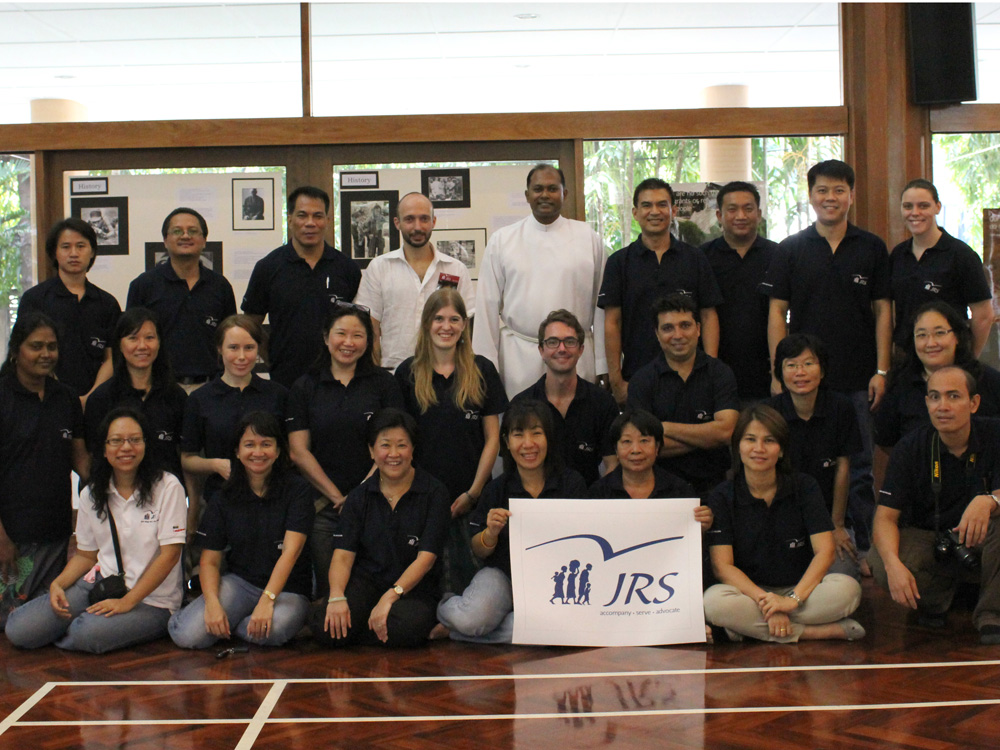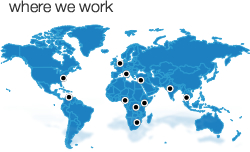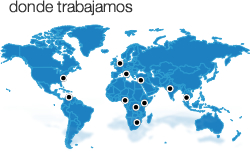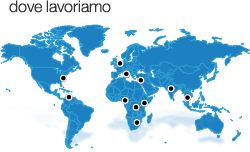
“…Struck by the plight of thousands of boat people and refugees, I felt it my duty to send cable messages to some 20 Major Superiors [of the Society of Jesus] around the world. Sharing my distress with them, I asked what they in their countries could do to bring at least some relief to such a tragic situation…” Fr Pedro Arrupe wrote 14 November, 1980 when he officially started the Jesuit Refugee Service. Arrupe, then the Superior General of the Society of Jesus, also known as the Jesuits, noticed the ability for Jesuits around the world to assist in refugee work.
Arrupe thought back to Saint Ignatius, the founder of the Society of Jesus, who took it upon himself to house Italian people forcibly displaced in Rome during the winter of 1538. Because the winter was so harsh, people were forced into the city of Rome to seek assistance, but many died in the streets due to hunger and cold. Ignatius and his first followers gave their beds to those in need and took in 300 people into their home. Arrupe said JRS was following in Ignatius’ footsteps by assisting the poor and displaced.
In 1981 Arrupe called a meeting in Bangkok to develop JRS Asia Pacific. He realised the need for emergency refugee care in the region and appointed a local staff of Jesuits and laypeople to do the job.
From an emergency response to crisis, the work of JRS expanded towards a longer-term commitment. The worldwide sympathy for refugees, which in 1979 had allowed so many to resettle, had diminished. Refugees were expected to wait in camps much longer, and were more likely to be rejected. They faced a correspondingly more unwelcoming reception in countries of first asylum. Thus, the long-term needs of refugees received increasing attention—education, support of culture and the ability to participate in the decisions which shaped their lives besides the needs of food, medicine and shelter.
JRS’ mission is to accompany, serve and advocate on behalf of refugees and other forcibly displaced persons. JRS undertakes services at national and regional levels with the support of an international office in Rome.
Thirty years after the genesis of JRS Asia Pacific, the work has grown to assist forcibly displaced persons in eight countries: Thailand, Cambodia, Timor Leste, Singapore, Papua New Guinea, the Philippines, Indonesia and Australia. The people who share in the mission of JRS in Asia Pacific has grown to include 137 employees and eight volunteers of different faith and cultural backgrounds.
2012 STRATEGIC FRAMEWORK
The goals adapt core issues underpinning JRS work since its establishment and make them relevant to the challenges of today: compassion on the edge of humanity, faith and justice, hope and education, and unity in action.
- Compassion for humanity on the edge: JRS pledges to be more flexible and focused in responding to new emerging situations of forced displacement. Strategies will focus on addressing the needs of urban refugees and persons vulnerable to trafficking.
- Rooted in faith, acting in justice: Inspired by faith and the values of inclusiveness and solidarity, JRS will seek to address the causes of structural inequality. JRS strategies focus on strengthening the role of advocacy, both at grassroots and global levels, and promoting intercultural, ecumenical and inter-faith dialogue.
- Kindling hope through learning: Based on the belief in the dignity and interdependence of the human family, JRS will empower uprooted people through learning, fostering a future filled with hope. Strategies focus on assisting the most vulnerable in education, emphasising girls' education and teacher training. In addition, actions will also seek to promote access of refugees to third level education and educational excellence through the distribution of best practices throughout the organisation and beyond.
- A stronger, more united JRS: Firmly rooted in the values of subsidiarity and participation, JRS will develop and apply coherent standards in governance and management, so that the organisation works with and for forcibly displaced persons, in international unity, with transparency and accountability.
"It is a great joy to see that this framework has been formulated so clearly and yet so humbly, so imbued with our Christian commitment and Ignatian vision. In this strategic framework we see faith, justice and collaboration joined once again in a single unified vision", he wrote.
A copy of the full text of the JRS Strategic Framework can be found on here
- Society of Jesus
|
Jesuits The Jesuit Refugee Service is an apostolic work of the Society of Jesus. For more than 460 years Jesuit priests and brothers have served the Church in new and unexpected ways. Men on the move, ready to change residence, occupation, approach – whatever is necessary to advance the Church’s mission: teaching the word of Jesus Christ and preaching his Good News – a radical service of faith in a world that respects neither faith nor the justice it entreats. Today, Jesuits have enhanced their cooperation to include men and women who share this vision of service to faith and justice. And this exchange has expanded to include dialogue with other religions and cultures. One of the most notable examples of this cooperation is the Jesuit Refugee Service. For more information about the Jesuits (Society of Jesus) click here. |







